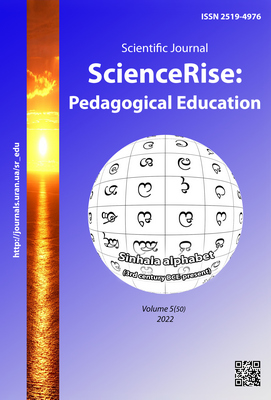Pedagogical modeling of the formation of organizational competence in future specialists in physical culture and sports of the Armed Forces of Ukraine
DOI:
https://doi.org/10.15587/2519-4984.2022.265102Keywords:
pedagogical modeling, model, organizational competence, future specialist in physical culture and sports, formationAbstract
A pedagogical model of the formation of organizational competence among future specialists in physical culture and sports of the Armed Forces of Ukraine with the disclosure of the content of all its components: goals and tasks, organizational and pedagogical conditions, content, methods, forms of formation, criteria and indicators for diagnosing the results of formation is proposed. Approaches to understanding the concept of "pedagogical modeling" are defined. All components of the model are interdependent and only in symbiosis ensure the formation of organizational competence in future specialists in physical culture and sports of the AF of Ukraine.
The model consists of the following blocks: target-methodological, theoretical, subject-subject, methodical, control-corrective and result: the target-methodological block reflects the target and task of forming organizational competence among future specialists in physical culture and sports of the AF of Ukraine, taking into account their professional knowledge, skills and abilities, professional and ethical standards, values and experience in the chosen profession; the theoretical block – the structure of their organizational competence and contains important requirements for its formation; the subject-subject block ensures the interaction of at least two subjects - a teacher and a cadet, the methodological basis of which is the subject-activity approach to the formation of the organizational competence of the latter; the methodological block – its gradual formation among respondents, which is implemented in a certain sequence; the control and correction unit provides for the implementation of such functions as diagnostic, regulatory and predictive, which in turn provide an opportunity to evaluate and control the acquired theoretical and practical knowledge by the respondents; the result block includes the result of the formation of organizational competence in future officers - specialists in physical culture and sports and the clarification of the levels of its formation using the criteria and indicators we have determined
References
- Shynkaruk, V. I. (Ed.) (1986). Filosofskyi slovnyk. Kyiv: Holov. red. URE, 800.
- Anisimov, M. V. (2011). Teoretyko-metodolohichni osnovy prohnozuvannia modelei u profesiino-tekhnichnykh navchalnykh zakladakh. Kyiv–Kirovohrad: POLIUM, 464.
- Bilyk, N. I. (2005). Modeliuvannia protsesu navchannia v systemi pidvyshchennia kvalifikatsii vchyteliv. Kyiv: Tsentralnyi instytut pisliadyplomnoi pedahohichnoi osvity Akademii pedahohichnykh nauk Ukrainy.
- Yezhova, O. V. (2014). Klasyfikatsiia modelei v pedahohichnykh doslidzhenniakh. Naukovi zapysky. Seriia: Problemy metodyky fizyko-matematychnoi i tekhnolohichnoi osvity, 5, 202–207.
- Kravchenko, V. (2016). Modelling the Professional Training of Higher School Teachersunder the Education Modernisation. Pedahohika formuvannia tvorchoi osobystosti u vyshchii i zahalnoosvitnii shkolakh, 51, 194–207.
- Lazariev, M. I. (2003). Polisystemne modeliuvannia zmistu tekhnolohii navchannia zahalnoinzhenernykh dystsyplin. Kharkiv: Vyd-vo NFaU, 356.
- Lodatko, Ye. O. (2010). Modeliuvannia pedahohichnykh system i protsesiv. Sloviansk: SDPU, 148.
- Meshchaninov, O. P. (2005). Suchasni modeli rozvytku universytetskoi osvity v Ukraini: teoriia i metodyka. Kyiv, 509.
- Semenova, A. V. (2009). Paradyhmalne modeliuvannia u profesiinii pidhotovtsi maibutnikh uchyteliv. Odesa: Yurydychna literatura, 504.
- Yakubovski, M. A. (2004). Teoretyko-metodolohichni osnovy matematychnoho modeliuvannia profesiinoi diialnosti vchytelia. Kyiv, 40.
- Campbell, T., Oh, P. S., Maughn, M., Kiriazis, N., Zuwallack, R. (2015). A Review of Modeling Pedagogies: Pedagogical Functions, Discursive Acts, and Technology in Modeling Instruction. EURASIA Journal of Mathematics, Science and Technology Education, 11 (1), 159–176. doi: http://doi.org/10.12973/eurasia.2015.1314a
- Walat, W. (2004). Modelowanie podręczników techniki-informatyki. Rzeszów: Wyd. Uniwersytetu Rzeszowskiego, 321.
- Trakaliuk, O. L., Iagupov, V. V. (2013). Model razvitiia spetcialnoi kompetentnosti dolzhnostnykh litc kadrovykh organov Vooruzhennykh sil Ukrainy. Vestnik Udmurtskogo universiteta. Filosofiia. Sotciologiia. Psikhologiia. Pedagogika, 4, 67–74.
- Iagupov, V. V. (2013). Modelirovanie professionalnoi kompetentnosti vypusknikov professionalnykh uchebnykh zavedenii. Novі tekhnologіi navchannia, 76, 144–152.
- Pohrebniak, D. V. (2019). Pedahohichne modeliuvannia rozvytku fakhovoi kompetentnosti nachalnykiv fizychnoi pidhotovky i sportu viiskovykh chastyn Zbroinykh syl Ukrainy u systemi pisliadyplomnoi osvity. Innovatsiina pedahohika, 18 (2), 67–72.
- Sierra, R. (2008). Modelo teórico para el diseño de una estrategia pedagógica en la educación primaria y secundaria básica. Tesis presentada en opción al grado científico de Doctor en Ciencias Pedagógicas. Ciudad de La Habana, 202.
- Podlasyi, I. P. (2003). Pedagogika. Book. 1: Obshchie osnovy. Protcess obucheniia. Moscow: VLADOS.
- Yahupov, V., Kyva, V. (2019). Pedagogical modelling of development of information and communication competence of professors of distance learning military education system. Applied Researches in Technics, Technologies and Education, 7 (3), 224–232. doi: http://doi.org/10.15547/artte.2019.03.007
- Bielikov, I. O. (2021). Criteria and indicators of diagnosis of formation of organizational competence in future specialists in physical culture and sports of the Armed Forces of Ukraine. Innovate Pedagogy, 38, 94–101. doi: https://doi.org/10.32843/2663-6085/2021/38.19
- Yahupov, V. V.; Dubaseniuk, O. A. (Ed.) (2016). Profesiina sub’iektnist, sub’iekt viiskovo-profesiinoi diialnosti yak intehralnyi rezultat profesiinoi pidhotovky ofitseriv. Teoriia i praktyka profesiinoi maisternosti v umovakh tsilozhyttievoho navchannia. Zhytomyr: Vyd-vo Ruta, 223–233.
Downloads
Published
How to Cite
Issue
Section
License
Copyright (c) 2022 Illia Bielikov

This work is licensed under a Creative Commons Attribution 4.0 International License.
Our journal abides by the Creative Commons CC BY copyright rights and permissions for open access journals.
Authors, who are published in this journal, agree to the following conditions:
1. The authors reserve the right to authorship of the work and pass the first publication right of this work to the journal under the terms of a Creative Commons CC BY, which allows others to freely distribute the published research with the obligatory reference to the authors of the original work and the first publication of the work in this journal.
2. The authors have the right to conclude separate supplement agreements that relate to non-exclusive work distribution in the form in which it has been published by the journal (for example, to upload the work to the online storage of the journal or publish it as part of a monograph), provided that the reference to the first publication of the work in this journal is included.







